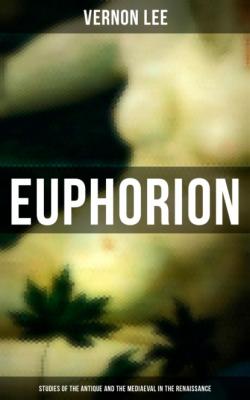Euphorion (Studies of the Antique and the Mediaeval in the Renaissance). Vernon Lee
Чтение книги онлайн.
Читать онлайн книгу Euphorion (Studies of the Antique and the Mediaeval in the Renaissance) - Vernon Lee страница 16
 wicked such a necessity to magnify a villain into a demon with archangelic splendour of power of evil, can exist only in minds pure and strong, braced up to virtue, virgin of evil, with a certain childlike power of wonder; minds to whom it appears that to be wicked requires a powerful rebellion; minds accustomed to nature and nature's plainness, to whom the unnatural can be no subject of sophistication and cynicism, but only of wonder. While, in Italy, Giraldi Cinthio prattles off to a gay party of ladies and gentlemen stories of murder and lust as frightful as those of "Titus' Andronicus," of "Giovanni and Annabella," and of the "Revenger's Tragedy," in the intelligent, bantering tone in which he tells his Decameronian tales; in England, Marston, in his superb prologue to the second part of "Antonio and Mellida," doubts whether all his audience can rise to the conception of the terrible passions he wishes to display:
wicked such a necessity to magnify a villain into a demon with archangelic splendour of power of evil, can exist only in minds pure and strong, braced up to virtue, virgin of evil, with a certain childlike power of wonder; minds to whom it appears that to be wicked requires a powerful rebellion; minds accustomed to nature and nature's plainness, to whom the unnatural can be no subject of sophistication and cynicism, but only of wonder. While, in Italy, Giraldi Cinthio prattles off to a gay party of ladies and gentlemen stories of murder and lust as frightful as those of "Titus' Andronicus," of "Giovanni and Annabella," and of the "Revenger's Tragedy," in the intelligent, bantering tone in which he tells his Decameronian tales; in England, Marston, in his superb prologue to the second part of "Antonio and Mellida," doubts whether all his audience can rise to the conception of the terrible passions he wishes to display:
If any spirit breathes within this round
Uncapable of weighty passion,
Who winks and shuts his apprehension up
From common sense of what men were and are,
Who would not know what men must be: let such
Hurry amain from our black visaged shows;
We shall affright their eyes.
The great criminals of Italy were unconscious of being criminals; the nation was unconscious of being sinful. Bembo's sonnets were the fit reading for Lucrezia Borgia; pastorals by Guarini the dramatic amusements of Rannuccio Farnesi; if Vittoria Accoramboni and Francesco Cenci read anything besides their prayer- book or ribald novels, it was some sugary "Aminta" or "Pastor Fido:" their own tragedies by Webster and Shelley they could never have understood.
And thus the Italians of the Renaissance walked placidly through the evil which surrounded them; for them, artists and poets, the sky was always blue and the sun always bright, and their art and their poetry were serene. But the Englishmen of the sixteenth century were astonished and fascinated by the evil of Italy: the dark pools of horror, the dabs of infamy which had met them ever and anon in the brilliant southern cities, haunted them like nightmare, bespattered for them the clear blue sky, and danced, black and horrible spots, before the face of the sun. The remembrance of Italian wickedness weighed on them like an incubus, clung to them with a frightful fascination. While the foulest criminals of Italy discussed the platonic vapidnesses of Bembo's sonnets, and wept at the sweet and languid lamentations of Guarini's shepherds and nymphs; the strong Englishmen of the time of Shakespeare, the men whose children were to unsheathe under Cromwell the sword of righteousness, listened awe-stricken and fascinated with horror to the gloomy and convulsed, the grand and frightful plays of Webster and of Tourneur. And the sin of the Renaissance, which the art of Italy could neither pourtray nor perceive; appeared on the stage decked in superb and awful garb by the tragic imagination of Elizabethan England.
1. The "Orlando Innamorato" of Boiardo contains, parti, canto 8, a story too horrible and grotesque for me to narrate, of a monster born of Marchino and his murdered sister-in-law, which forms a strange exception to my rule, even as does, for instance, Matteo di Giovanni's massacre of the Innocents. Can this story have been suggested, a ghastly nightmare, by the frightful tale of Sigismondo Malatesta and the beautiful Borbona, which was current in Boiardo's day?
Конец ознакомительного фрагмента.
Текст предоставлен ООО «ЛитРес».
Прочитайте эту книгу целиком, купив полную легальную версию на ЛитРес.
Безопасно оплатить книгу можно банковской картой Visa, MasterCard, Maestro, со счета мобильного телефона, с платежного терминала, в салоне МТС или Связной, через PayPal, WebMoney, Яндекс.Деньги, QIWI Кошелек, бонусными картами или другим удобным Вам способом.